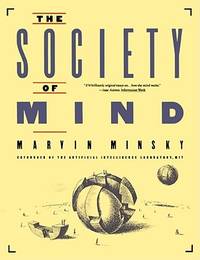

Stock Photo: Cover May Be Different
The Society of Mind
by Minsky, Marvin
- Used
- Good
- Paperback
- Condition
- Good/No dust jacket issued
- ISBN 10
- 0671657135
- ISBN 13
- 9780671657130
- Seller
-
Silver Spring, Maryland, United States
Payment Methods Accepted
About This Item
New York: Simon and Schuster, A Touchstone Book, 1988. Tenth printing. Trade paperback. Good/No dust jacket issued. Juliana Lee. Format is approximately 8.5 inches by 11 inches. 339, [1] pages. Illustrations. Glossary. Bibliography. Index. Book has some lower right corner curving. Cover has some edgewear and soiling. No dust jacket issued. Isaac Asimov, in Information Week, described this work as "270 brilliantly original essays on ...how the mind works." This book tries to explain how the mind works. The Society of Mind is a construct in which each mind is made up of many smaller processes, which Minsky called agents. Each mental agent by itself can only do some simple thing that needs no mind or thought at all. Yet when these agents join other agents in societies--in certain very special ways--this leads to true intelligence. Marvin Lee Minsky (August 9, 1927 - January 24, 2016) was an American cognitive scientist in the field of artificial intelligence (AI), co-founder of the Massachusetts Institute of Technology's AI laboratory, and author of several texts on AI and philosophy. In the early 1970s, at the MIT Artificial Intelligence Lab, Minsky and Papert started developing what came to be called the Society of Mind theory. The theory attempts to explain how what we call intelligence could be a product of the interaction of non-intelligent parts. Minsky says that the biggest source of ideas about the theory came from his work in trying to create a machine that uses a robotic arm, a video camera, and a computer to build with children's blocks. In 1986, Minsky published The Society of Mind, a comprehensive book on the theory which, unlike most of his previously published work, was written for a general audience. Marvin Minsky -- one of the fathers of computer science and cofounder of the Artificial Intelligence Laboratory at MIT -- gives a revolutionary answer to the age-old question: "How does the mind work?" Minsky brilliantly portrays the mind as a "society" of tiny components that are themselves mindless. Mirroring his theory, Minsky boldly casts The Society of Mind as an intellectual puzzle whose pieces are assembled along the way. Each chapter -- on a self-contained page -- corresponds to a piece in the puzzle. As the pages turn, a unified theory of the mind emerges, like a mosaic. Ingenious, amusing, and easy to read, The Society of Mind is an adventure in imagination. Derived from a Publishers Weekly article: Minsky, cofounder of MIT's Artificial Intelligence Lab, is a charter member of the community of AI pioneers committed to understanding the workings of the human mind and mimicking its processes by computer. Here he takes his place as this generation's Buckminster Fuller, a revered seminal thinker whose depth and originality sometimes place him out of reach for many. But Minsky's difference is his style: he writes aphoristically, with wit and precision, and makes the most of his perception that the mind learns by images, which perform as agents that connect, interact and even "censor'' in a staggeringly subtle 'society' of microprocedures. This holistic view of the mind's learning stages is the culmination of Minsky's study, and its insights into the developing world of computers-as-machines are matched by paradoxically intuitive glimpses of the growth of a sense of' self' through introspection, short- and long-term memory, mind-frames utilizing pictures and language. Minsky's creative terminology for freshly perceived mental processes is a major contribution to the future of mind-science.
Reviews
(Log in or Create an Account first!)
Details
- Bookseller
- Ground Zero Books
(US)
- Bookseller's Inventory #
- 72068
- Title
- The Society of Mind
- Author
- Minsky, Marvin
- Illustrator
- Juliana Lee
- Format/Binding
- Trade paperback
- Book Condition
- Used - Good
- Jacket Condition
- No dust jacket issued
- Quantity Available
- 1
- Edition
- Tenth printing
- Binding
- Paperback
- ISBN 10
- 0671657135
- ISBN 13
- 9780671657130
- Publisher
- Simon and Schuster, A Touchstone Book
- Place of Publication
- New York
- Date Published
- 1988
- Keywords
- Brain; Thought; Intelligence; Neural Networks; Thought; Reasoning; Consciousness; Memory; Piaget; Papert's Principle; Learning; Conceptualization
Terms of Sale
Ground Zero Books
Books are offered subject to prior sale. Satisfaction guaranteed. If you notify us within 7 days that you are not satisfied with your purchase, we will refund your purchase price when you return the item in the condition in which it was sold.
About the Seller
Ground Zero Books
Biblio member since 2005
Silver Spring, Maryland
About Ground Zero Books
Founded and operated by trained historians, Ground Zero Books, Ltd., has for over 30 years served scholars, collectors, universities, and all who are interested in military and political history.
Much of our diverse stock is not yet listed on line. If you can't locate the book or other item that you want, please contact us. We may well have it in stock. We welcome your want lists, and encourage you to send them to us.
Much of our diverse stock is not yet listed on line. If you can't locate the book or other item that you want, please contact us. We may well have it in stock. We welcome your want lists, and encourage you to send them to us.
Glossary
Some terminology that may be used in this description includes:
- Jacket
- Sometimes used as another term for dust jacket, a protective and often decorative wrapper, usually made of paper which wraps...
- Trade Paperback
- Used to indicate any paperback book that is larger than a mass-market paperback and is often more similar in size to a hardcover...

